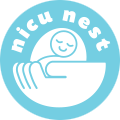We all know that germs spread disease and that handwashing is the best thing we can do to stop germs and prevent infections. But that doesn’t mean that we are washing up as often as we should. So we need to be on a mission to get everyone who comes into contact with your baby, including you, to sanitize their hands every time this is needed!
Why this important? In the intensive care environment babies are in their most fragile state and can get very sick from infection. The moment that you finish washing your hands, you start to collect germs again by touching things (doors, cell phone, personal belongings, the warmer or incubator, etc). You cannot avoid collecting germs, but you can reduce the chance of infecting your baby by knowing when to sanitize your hands.
When do you need to wash your hands?
1. Wash your hands every time you enter the NICU prior to going to your baby’s room.
Follow these steps:

• Roll up your sleeves above your elbows.
• Take off all watches, rings, and jewelry and store safely or pin them to your clothing. The designs and crevices of jewelry may contain germs that can’t be killed by scrubbing. Please leave expensive jewelry at home.
• Artificial nails, long nails, and nails with chipped polish have also been shown to carry more germs than short, natural nails. Please consider keeping your nails natural and short while your baby is in the NICU.
• Wash from your fingertips to your elbows for 3 minutes with the soap sponge. Pay special attention to the area around and under the fingernails. Plastic nail cleaners are included in the kit at the sinks.
• Dry your hands with paper towels after washing.
2. Foam your hands prior to entering, and when exiting your baby’s room

3. Foam your hands right before touching your baby, and after you comforted your baby, prior to do any other task unrelated to touching your baby
4. Foam your hands again after touching your face or eyes, after changing your baby’s diaper and when going from one baby to another if you have more than one baby in the NICU.
5. If you changed your baby’s diaper you should wash your hands thoroughly with soap and water.
Washing your hands is the best way to protect your baby from infection. Please share this information with your family and friends.
